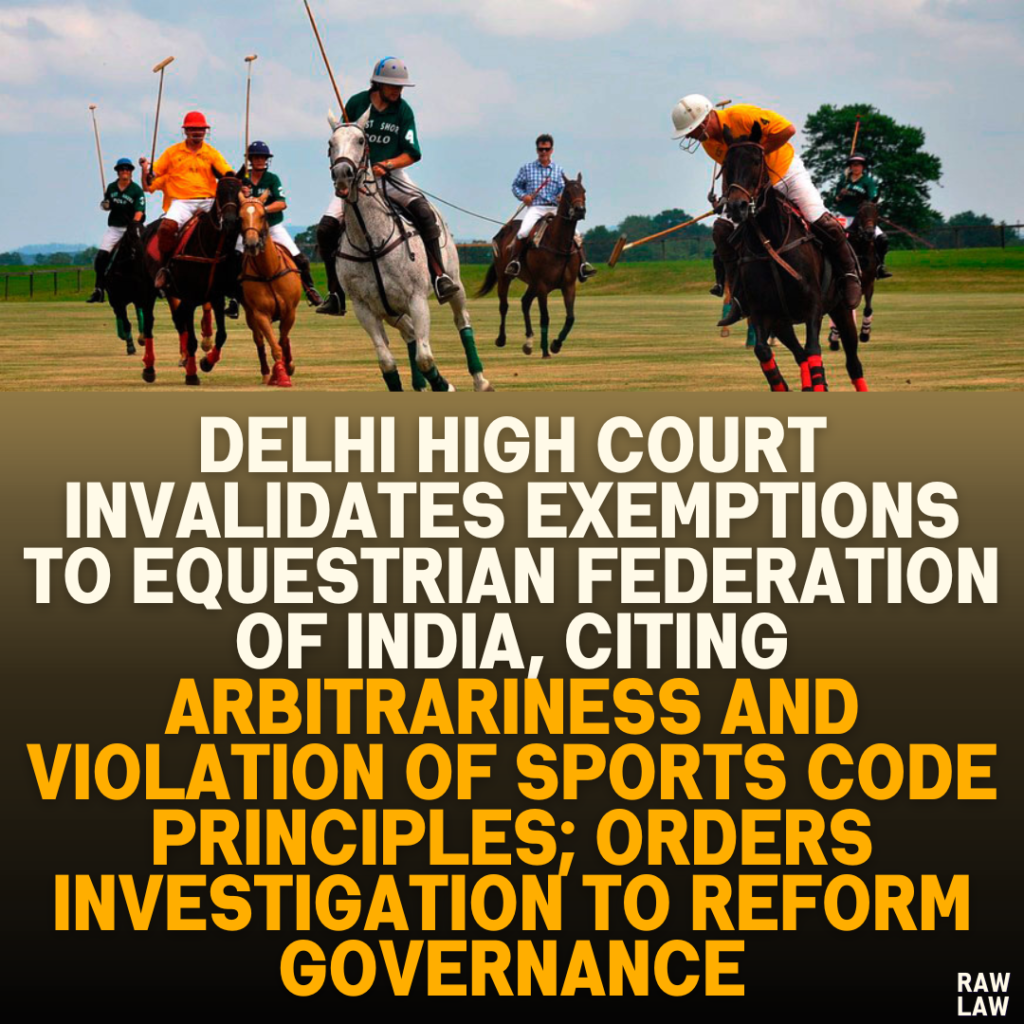Court’s Decision
The Delhi High Court ruled that the exemptions granted to the Equestrian Federation of India (EFI) under the National Sports Development Code, 2011 (Sports Code) are arbitrary, lack factual basis, and undermine the core principles of transparency, inclusivity, and representation enshrined in the Sports Code. A Fact-Finding Committee was constituted to investigate the ground realities of equestrian sports and recommend corrective measures. The exemptions were allowed to continue temporarily as an interim measure until the committee completes its work and the Ministry of Youth Affairs and Sports (MYAS) reviews its findings.
Facts
- Petitioner’s Background: The Rajasthan Equestrian Association, a recognized State-level association, challenged the exemptions granted to EFI, arguing they were unconstitutional and contrary to the Sports Code.
- Impugned Exemptions:
- EFI was exempted from maintaining affiliated units in at least two-thirds of States/UTs.
- Clubs and individuals were allowed voting rights, bypassing the representative pyramidical structure of State and District associations.
- Exemptions were granted under the “Relaxation Clause” introduced in 2021 to address “special needs” of specific sports.
- Respondents’ Justification:
- The unique nature of equestrian sports, involving human and equine athletes, required exemptions from standard governance norms.
- Infrastructure and resources for equestrian sports were largely limited to private clubs and military facilities, necessitating flexibility.
Issues
- Validity of the Relaxation Clause: Whether the clause empowering MYAS to grant exemptions aligns with the principles of governance and equality under the Sports Code.
- Justifiability of Exemptions to EFI: Whether the exemptions to EFI were warranted based on factual evidence and aligned with the objectives of the Sports Code.
Petitioner’s Arguments
- Undermining the Sports Code:
- The exemptions undermine the transparency and democratic governance mandated by the Sports Code.
- EFI’s structure was dominated by Army-affiliated entities, sidelining State and District associations.
- Favoritism and Inequity:
- Granting voting rights to clubs at the national level violated the pyramidical structure of representation, which prioritizes grassroots participation.
- EFI revoked State association memberships while increasing memberships of clubs controlled by the Army.
- Non-compliance with Governance Principles:
- EFI had persistently violated the Sports Code, and the exemptions only perpetuated its non-compliance.
Respondent’s Arguments
- Necessity of the Exemptions:
- Equestrian sports are inherently club-based, requiring expensive infrastructure and resources unavailable at State and District levels.
- Voting rights for clubs and exemptions from compliance ensure the sport’s promotion and participation.
- Temporary Nature of Exemptions:
- The exemptions are interim measures until sufficient State and District associations are established.
- The MYAS retained oversight to ensure long-term alignment with the Sports Code.
Analysis of the Law
- Validity of the Relaxation Clause:
- The court upheld the Relaxation Clause as a valid policy tool but emphasized its strict and judicious application, requiring written reasons for granting exemptions.
- Compliance with the Sports Code:
- The Sports Code mandates a pyramidical governance structure, ensuring representation from State and District levels to avoid power concentration.
- Deviating from this structure without compelling evidence contravenes the principles of good governance.
- Principles of Transparency and Accountability:
- Exemptions to EFI diluted the representative structure and concentrated power within a narrow group of stakeholders (clubs and Army-affiliated entities).
- The MYAS failed to conduct a detailed fact-finding exercise before granting exemptions, leading to arbitrary decision-making.
Precedent Analysis
- Rahul Mehra v. Union of India: The court emphasized strict compliance with the Sports Code to promote transparency, accountability, and fairness in sports governance.
- Aslam Sher Khan v. Union of India: Non-compliance with the Sports Code undermines its fundamental objectives and integrity.
Court’s Reasoning
- Arbitrariness of Exemptions:
- EFI’s claim that horses are “athletes” contradicted the Sports Code, which classifies them as equipment.
- The rationale for exemptions was based on generalized assumptions rather than verified evidence.
- Violation of Representation Principles:
- The exemptions prioritized club memberships over State and District associations, undermining inclusivity and grassroots development.
- EFI’s governance was disproportionately influenced by Army-affiliated entities, sidelining regional interests.
- Governance Failures:
- EFI did not provide infrastructure or financial support to athletes, instead relying on private clubs and Army facilities.
- The exemptions institutionalized an unequal system that excluded aspiring athletes from under-represented regions.
Conclusion
The court invalidated the exemptions, stating they:
- Contradict the Sports Code’s principles of transparency, inclusivity, and accountability.
- Lack a factual foundation and empirical evidence justifying their necessity.
- Perpetuate governance inequities, concentrating power within a narrow group.
The court directed the establishment of a Fact-Finding Committee, chaired by a retired judge, to:
- Investigate the state of equestrian sports infrastructure, athlete participation, and governance in India.
- Recommend reforms to align EFI’s governance with the Sports Code.
Implications
- Strengthening Sports Governance:
- The judgment reinforces the non-negotiable nature of compliance with the Sports Code for National Sports Federations.
- It ensures accountability and fair representation in sports administration.
- Impact on EFI:
- EFI must align its governance structure with the Sports Code, prioritizing grassroots participation and State-level representation.
- The exemptions remain operational only as an interim measure, subject to the Fact-Finding Committee’s findings.
- Precedent for Other NSFs:
- The judgment serves as a benchmark for evaluating exemptions granted to other sports federations, promoting uniformity and inclusivity in sports governance.
Court’s Directions
- Constitution of the Fact-Finding Committee:
- Led by a retired High Court judge with representatives from MYAS, SAI, IOA, and two prominent equestrian sportspersons.
- Tasked with assessing infrastructure, participation, and governance in equestrian sports.
- EFI’s Cooperation:
- EFI must fund the committee’s work and provide necessary information for the investigation.
- Temporary Continuation of Exemptions:
- Exemptions remain operational as an interim measure to avoid disruption in EFI’s administration, subject to review based on the committee’s report.




Delhi High Court Invalidates Exemptions to Equestrian Federation of India, Citing Arbitrariness and Violation of Sports Code Principles; Orders Investigation to Reform Governance – Raw Law
[url=http://www.g8yne038ga9227e34cdmh22rh6eo3f25s.org/]ulendosbyz[/url]
alendosbyz
lendosbyz http://www.g8yne038ga9227e34cdmh22rh6eo3f25s.org/